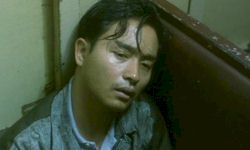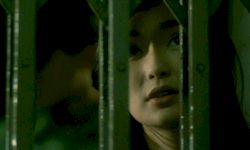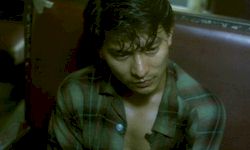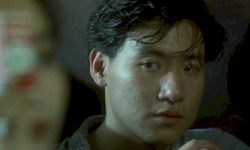|
|
review | notes | awards | availability | |
|






Availability:
DVD (Hong
Kong)
Region 0 NTSC
Mega Star/Media Asia
16x9 Anamorphic Widescreen
Cantonese Language Tracks
Dolby Digital 5.1 / DTS 5.1
Removable English, Chinese, Japanese, Korean, Thai,
Bahasa and Vietnamese Subtitles
*Also Available on Blu-ray Disc
DVD (USA)
Region 1 NTSC
Kino International Video
16x9 Anamorphic Widescreen
Cantonese Language Track
Dolby Digital 5.1
Removable English Subtitles
Trailers, Stills Gallery, Filmographies
Awards:
10th
Annual HK Film Awards
• Winner - Best
Picture
• Winner - Best Director (Wong
Kar-Wai)
• Winner - Best Actor (Leslie
Cheung)
• Winner - Best Cinematography (Christopher
Doyle)
• Winner - Best Art Direction (William Cheung
Suk-Ping)
• Nomination - Best Actress (Carina Lau
Ka-Ling)
• Nomination - Best Supporting Actress (Rebecca
Pan)
• Nomination - Best Screenplay (Wong
Kar-Wai)
• Nomination - Best Editing (Patrick
Tam Ka-Ming)
Notes:
• Tony Leung Chiu-Wai appears very briefly at
the end of the film in a seemingly unconnected cameo.
The purpose of his introduction was actually to lead
into a follow-up film, but the sequel was never realized.
The commercial failure of the film made a sequel unviable,
despite Wong Kar-Wai having shot many, many feet of
film with Tony Leung Chiu-Wai. Even now Wong is asked
about a supposed sequel to Days of Being Wild,
but the possibility of the missing footage ever being
shown has grown increasingly remote.
• Wong Kar-Wai has made mention that In the
Mood for Love was his unofficial follow-up to
Days of Being Wild, in which the characters
played by Tony Leung Chiu-Wai and Maggie Cheung embark
on their near-affair. Maggie Chueng's character is
named So Lai-Chun in both films.

|
|
|
Review
by Kozo: |
Though this was Wong Kar-Wai's second film, it could
easily be said that this was the one that started it
all. Days of Being Wild possesses all the trademarks
of Hong Kong's celebrated auteur: heavy doses of post-modern
reflection, characters mired in paralyzing existentialism,
exquisite cinematography, exacting pacing, sultry atmosphere,
and an entirely too obvious "art film" air.
For every person who swears this is a Hong Kong Cinema
masterpiece, you'll find someone who decrys the film
as boring and pretentious. And really, it's hard not
to see the merit of either case.
The film's story is nothing
too special. Leslie Cheung stars as York, a well-off
layabout in 1960 Hong Kong. York is as charismatic as
he is despicably selfish; his typical deal is to draw
women around him into his self-centered web, only to
betray them emotionally. The first victim we see is
a shy girl from Macau named So Lai-Chun (Maggie Chueng),
who he charms with the immortal line that for one minute
on April 16th, 1960, the two were friends. Sadly, his
affections prove fleeting and destructive. Lai-Chun
realizes too soon that York only loves himself, and
is quick to leave.
However, the damage has
been done. Despite realizing York's inability to really
care for her, she's driven into a romantic tailspin.
Now unable to sleep and suffering from heartbreak, she
finds solace in the platonic company of a beat cop (Andy
Lau) who wanders the night streets in an entirely too-calm
manner. He ends up developing his own minor attachment
to Lai-Chun, but the moment is never realized.
Meanwhile, York has moved onto
Mimi, a sassy cabaret dancer played with scenery-chewing
flair by Carina Lau. Unlike Lai-Chun, Mimi is seemingly
willful, but her apparent strength is not what it seems.
When York jilts her, her reaction is pathetic, and yet
painfully real. Her irrational desire to retain York's
affections draws in York's friend (Jacky Cheung), who
harbors his own requited affection for Mimi. Despite
her obvious disdain, he pines after her in his own pathetic
manner. And, since it's a Hong Kong summer, it's incessantly
hot, muggy and rainy. It's almost out of a screenwriting
textbook.
What's the purpose of
this extended soap opera? For many, it could be the
obvious existentialism of it all. Love grows and fades,
people behave in disgustingly real ways, and nobody
does anything remotely heroic or inspiring. It points
to the maddening circle of human emotions, which leads
from heartbreak to self-doubt and possibly even the
onset of delusion. It's as depressing as it is real,
which is why it's obviously an "art film."
This is where some people decide to walk out and vow
never to support Wong Kar-Wai ever again.
The apparent genesis of
York's selfish (and ultimately self-destructive) behavior
seems to be the apparent rejection by his real mother,
who left him with a Hong Kong prostitute (Rebecca Pan).
One could immediately decide that this is the reason
behind York's entire modus operandi: a self-indulgent
mother-complex. It's like something in a bad TV drama;
if people were to decry the narrative as obvious and
uninspiring, they probably wouldn't be wrong.
But, that would be the
most likely reasoning if the film made its narrative
the primary concern. In Days of Being Wild, and
indeed in every other Wong Kar-Wai film, the narrative
is really the last thing on the director's mind. What
concerns him are the details: atmosphere, setting, fleeting
emotion, and the terrible preciousness of memory. The
physical details of the film are exquisite, such as
the way Maggie Cheung's hair falls in front of her face,
or the precision with which Leslie Cheung combs his
hair. Wong shows so much of his characters through his
choices, be they with the actors or with the camera.
There is an appreciable artistry to the way he and cinematographer
Christopher Doyle frame their shots, creating a divide
or an intimacy through exact spacing. Wong uses his
infamous voice-over exposition too, but unlike in Chungking
Express or Fallen Angels, the device is used
sparingly. He wisely gets his actors and his scenes
to do the telling.
Wong's obvious use of
style and technique creates the immediate impression
that this is "art," thus alienating a good
portion of the audience. Then again, the skill and emotional
weight with which he pulls it off is remarkable. It's
not hard to be drawn into the lives of these characters,
who are so unmovie-like as to be patently bothersome.
Everything the characters go through simply happens,
and isn't the result of some cathartic response to onscreen
stimuli. His actors are uniformly impressive in that
no artifice exists to their craft. It's amazing that
a director can take mega popstars and wring such naked
performances from them, but that's exactly what he does.
It's a process that takes patience and retake after
retake. His isn't a job for a person with a short attention
span.
Still, asking the audience
to appreciate Wong's creation is not an easy task. Days
of Being Wild is a film that rewards only as much
as the viewer is willing to put in. If you walk in expecting
the movie to tell you something, then you'll probably
not be happy. This is a movie to discover, and indeed
the film improves the more one views it. As mentioned
previously, one could view Days of Being Wild and decide that it's just pretentious existentialism
with a too obvious message. However, there are undoubtedly
those who will find much, much more in the details Wong
has so carefully put together. This is a movie which
varies depending on individual taste—the exact
antithesis of commercial filmmaking. And like the film
or not, this much is certain: not many people could
make a movie like Wong Kar-Wai. (Kozo 1993/2003)
|
|
|